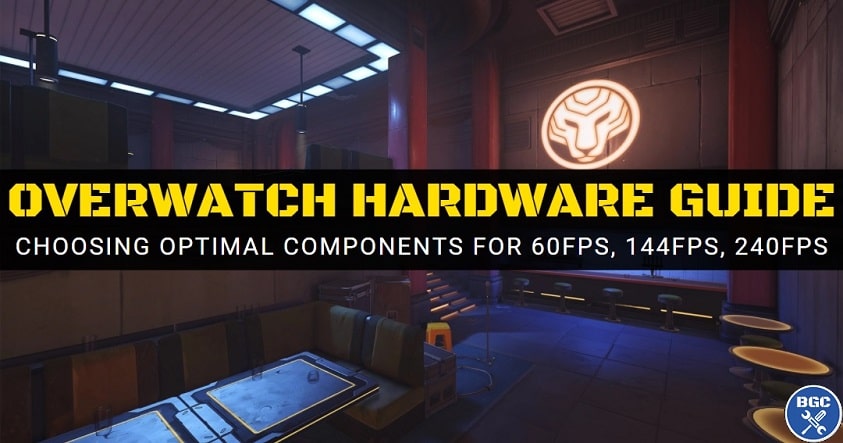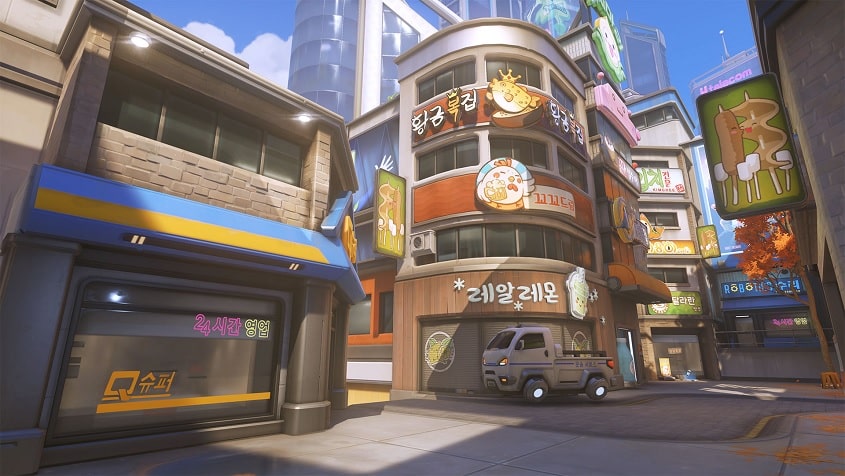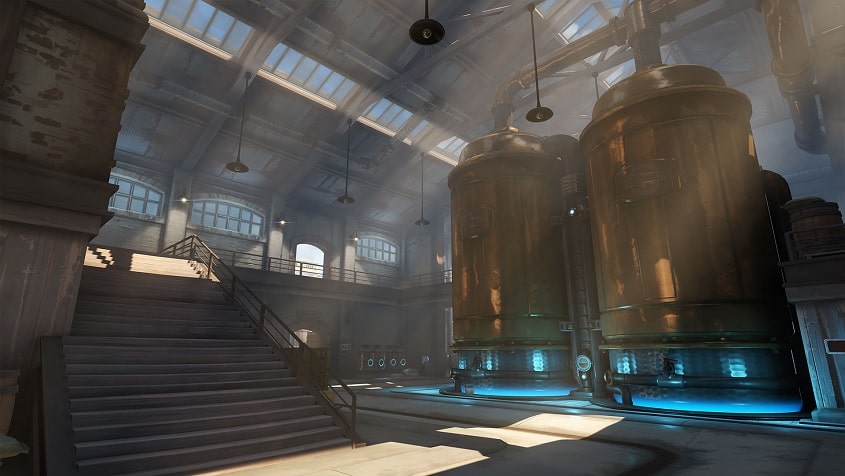Build the Best PC for Overwatch (2022)
CPU and GPU Requirements for 60FPS, 144FPS, 240FPS, 360FPS (1080p / FHD)
 Overwatch is a competitive FPS/shooter where high frame rates are important to playing at your pinpoint precise best
Overwatch is a competitive FPS/shooter where high frame rates are important to playing at your pinpoint precise bestLast Updated: January 15, 2022
Overwatch 2 is around the corner, but the original remains one of the most played, most watched, and most popular shooters around. If you're upgrading or building a new PC for Overwatch and want to ensure fast performance to play at your best, in this hardware buyer's guide we break down everything you need to know about choosing optimal components including the bare minimum system requirements and recommended CPUs and GPUs for 60FPS, 144FPS, or even 240FPS and 360FPS for competitive players. Overwatch is a very fast-paced game, which is best played at super-smooth (and ideally super-high) frame rates.
Related: Build the Best PC for Fortnite
How Demanding is Overwatch? (Minimum Specs to Run Game)
Before we get into top performance levels for competitive play, let's quickly cover the official minimum requirements to just run the game as a casual player. Like CSGO or Valorant, other extremely popular competitive FPS titles, generally speaking Overwatch isn’t very demanding on PC hardware, and any fairly basic modern computer that has a graphics card (or good APU) will have no problem being able to run it just fine.
Overwatch System Requirements (Minimum)
CPU: Intel Core i3 or AMD Phenom X3 8650
Graphics Card: NVIDIA GeForce GTX 460, ATI Radeon HD 4850, or Intel HD Graphics 4400
RAM/Memory: 4GB
Overwatch System Requirements (Recommended)
CPU: Intel Core i5 or AMD Phenom II X3 or better
Graphics Card: NVIDIA GeForce GTX 660 or AMD Radeon HD 7950 or better
RAM/Memory: 6GB
Source: Blizzard
 Overwatch isn't an overly demanding game, but you'll need to pay attention to your specs if you want high frame rates
Overwatch isn't an overly demanding game, but you'll need to pay attention to your specs if you want high frame ratesBest Monitors for Overwatch (144Hz vs 240Hz vs 360Hz)
60Hz monitors are fine if you're a casual gamer just wanting to have some fun, but if you're a pro or aspiring pro Overwatch player, or you're a more serious casual player (as in, you don't care about the pro scene but you still want to play at your absolute best with every edge possible), you ideally want a 144Hz monitor for Overwatch (1080p resolution, so specifically a 1080p 144Hz monitor).
Good news is, these days they're not much more expensive than regular 1080p 60Hz screens, so competitive gamers will absolutely want to get a 144Hz screen for this particular title to maximize “smoothness” and lower input latency, which could lead to better in-game results too. On a tighter budget, a 60Hz screen will do and still offers a smooth ride if you stay above 60FPS, but for Overwatch a 144Hz screen is highly recommended. Serious players will also seriously want to consider 240Hz which will deliver the ultimate experience in terms of the fastest-updating visuals on-screen and the lowest input latency.
See Also: The Best Gaming Monitors

Most professional Overwatch League players use the lightning-fast HP Omen X 25 240Hz Monitor

The Asus ROG Swift PG258Q 240Hz Monitor is also popular among pro Overwatch gamers.
Pro Overwatch League players almost exclusively use 240Hz displays, with the exception of just a few (AFAIK), though that could have changed by now and I wouldn't be surprised if every single Overwatch pro uses 240Hz. 360Hz screens are now a reality too, which promises even faster displays and even lower latency, so you can be sure that some pros will start migrating to these screens as well if they haven't already.
Does that mean YOU need a 240Hz or 360Hz monitor too, just because the pros do? Of course not, and a 144Hz screen is still quite fast, but if you do take your gaming and eSports seriously, to play at your absolute best and to have every little edge as possible over the competition (or more so to avoid them having any edge over you), I would definitely consider investing in a good 240Hz gaming monitor.
That said, the jumps up from 144Hz to 240Hz or from 240Hz to 360Hz aren't as big as the step up from 60Hz to 144Hz though (which is quite noticeable for serious players with a good eye), so any higher than 144Hz does give somewhat diminishing returns and isn't necessary to "play at your best". But yeah, pro players all use 240Hz+, so use that information as you will.
NVidia vs AMD GPUs: Which is Faster for Overwatch?
If you're wondering which graphics card is best for Overwatch, unlike CS:GO which runs faster with AMD Radeon GPUs, NVidia cards have proven to give slightly better performance in Overwatch. Therefore, all our graphics card recommendations below will be for team green, as this Overwatch build guide is here to help you get the highest frame rate for your money after all.
This site is 100% fanboy free, so we simply recommend whatever is objectively better for any particular game/situation, and so because the benchmark data we've come across online favors NVidia, that's what we suggest if you want the fastest PC for Overwatch.
Of course, feel free to get an AMD equivalent if you’ll be playing other games or you're a casual player who doesn't care about squeezing out every extra frame you can. But if Overwatch is all you play, we recommend choosing a NVidia card to get 5-10% better frame-rates in this particular title.
Related: How to Choose a Gaming GPU
 Overwatch was developed using Blizzard's own in-house proprietary game engine
Overwatch was developed using Blizzard's own in-house proprietary game engineBest PC Builds for Overwatch (All Performance Levels)
Alright, let's finally get into our component recommendations for an Overwatch PC build for various budgets. Our recommended parts below are what you'll require (based on studying multiple benchmarks) to comfortably achieve a certain performance level such as 60FPS or 144FPS - and to do it consistently so that your system performs above that level to give yourself some headroom during chaotic high-action moments of the game (so that your FPS won't dip under). In other words, if you want 144FPS, you ideally want your gaming PC to be capable of an average of 180-200FPS or even higher.
In these Overwatch PC build recommendations we won't mention the other parts required for a working PC (motherboard, power supply, case, storage, operating system) as we’ll only be talking about the components that directly affect gaming performance (CPU, GPU, RAM). For full PC build examples you can go ahead and setup, see our main always-updated gaming PC build guides in conjunction with this guide.
Also, we won’t be covering PC requirements for higher resolutions than 1080p (such as 1440p or 4K) as the vast majority of Overwatch players stick to 1080p (AKA Full HD, 1920 x 1080 pixels) to get the highest, most consistent frame rates - important for a competitive FPS (First-Person Shooter) title like this. That said, 1440p 144Hz screens would be great for casual Overwatch too, so if you use one of those screens then keep in mind you'll need a stronger parts-list (especially GPU) than what you require for 1080p 144Hz.
No Time to Build a PC? Best Value Prebuilt PCs
Cheapest Overwatch Specs for 1080p (60FPS at Low/Competitive Settings)
CPU: AMD Ryzen 3 3200G (APU) / Ryzen 3 5300G (APU)
GPU: AMD Vega Integrated (Comes With AMD APUs)
RAM: 8GB DDR4 (2x4GB, 2666MHz or faster)
Best Value Overwatch Specs for 1080p (144FPS at Low/Competitive Settings)
CPU: Intel Core i3-12100 / i3-10100 or AMD Ryzen 3 3100 / 3300X
GPU: NVidia GeForce RTX 3050 / GTX 1650 Super or AMD Radeon RX 6500 XT / RX 5600 XT
RAM: 16GB DDR4 (2x8GB, 3200MHz)
Best Pro Overwatch Specs for 1080p (240FPS at Low/Competitive Settings)
CPU: Intel Core i5-12400 / i5-12600K or AMD Ryzen 5 5600X
GPU: NVidia GeForce RTX 3060 Ti / 2070 Super or AMD Radeon RX 6700 XT
RAM: 16GB DDR4 (2x8GB, 3200MHz)
Ultimate Overwatch Specs for 1080p (360FPS at Low/Competitive Settings)
CPU: Intel Core i7-12700K / i7-11700K / i9-10900K or AMD Ryzen 7 5800X / Ryzen 9 5900X
GPU: NVidia GeForce RTX 3080 / 3070 Ti or AMD Radeon RX 6800 XT
RAM: 16GB DDR4 (2x8GB, 3200MHz)
Trusted VPN
VPN software can be important in this day and age, especially if you do lots of online banking and/or use public WiFi whilst travelling. Having a VPN adds an extra layer of security to your PC or laptop when online to help protect your data, passwords, financials, etc from hackers or malicious programs. It can also let you access region-locked content (eg US Netflix from overseas). For gamers their can be even more benefits to using a VPN.
Because they're so popular these days, there are countless VPN providers, and it can be confusing to pick one. If you want my 2 cents, after a lot of research I decided on NordVPN 'cause it's one of the fastest, most reliable VPNs for both gaming and general use, with a lot of credible reviews out there backing that up. They also quite often run very solid deals.
Popular Articles (see all)
Search the Site
About the Author (2025 Update)
I'm an indie game developer currently very deep in development on my first public release, a highly-immersive VR spy shooter set in a realistic near-future releasing on Steam when it's ready. The game is partly inspired by some of my favorites of all time including Perfect Dark, MGS1 and 2, HL2, Splinter Cell, KOTOR, and Deus Ex (also movies like SW1-6, The Matrix, Bladerunner, and 5th Element).
Researching, writing, and periodically updating this site helps a little with self-funding the game as I earn a few dollars here and there from Amazon's affiliate program (if you click an Amazon link on this site and buy something, I get a tiny cut of the total sale, at no extra cost to you).
Hope the site helps save you money or frustration when building a PC, and if you want to support the countless hours gone into creating and fine-tuning the many guides and tutorials on the site, besides using my Amazon links if purchasing something, sharing an article on socials or Reddit does help and is much appreciated.

